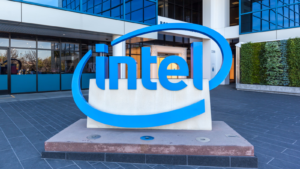We’re out of January and finally settling into the 2023 year. After ending 2022 in the red, all the major indices are showing gains through the first month of the year. But not is all on Wall Street – there are still plenty of laggards out there that include F-rated stocks to sell.
My Portfolio Grader tool evaluates stocks to sell or to buy based on earnings performance, analyst sentiment, momentum and other quantitative measurements to assign equities an “A” through “F” grade. Like in school, you want to be looking for those “A” grades – and holding too many “F’s” will lead to plenty of disappointment.
Now that we’re getting an idea of what the market holds for us this year – continued conflict in Ukraine, interest rates rising at a slower rate than last year and downsizing in the tech industry, we can make a fair estimate of F-rated stocks to sell this month.
| BYND | Beyond Meat | $20.53 |
| LCID | Lucid Group | $12.53 |
| INTC | Intel | $29.93 |
| WISA | WiSA Technologies | $9.02 |
| JAGX | Jaguar Health | $4.58 |
| CVNA | Carvana | $18.37 |
| FUBO | FuboTV | $3.18 |
Beyond Meat (BYND)

Food company Beyond Meat (NASDAQ:BYND) took off like a cat on fire when the stock when public in May 2019. By that July, shares were up more than 250% as investors really bought into the notion of plant-based burgers that replicated the look and taste of beef patties.
The thinking at the time was that health-conscious consumers would be eager to replace their hamburgers with a healthier option – even if the cost was more than ground beef.
But the hype hasn’t lived up to the reality. Beyond Meat has trouble generating sales and its quarterly earnings are consistently below analysts’ expectations. No surprise: BYND stock is down 75% over the last 12 months.
Earnings for the third quarter included revenue of $82.5 million, which was down 22.5% from a year earlier, and lower than analysts’ estimates of $84.56 million. Earnings per share was a loss of $1.60 per share, which was worse than the -$1.15 EPS that analysts expected, making it one of the stocks to sell while you still can.
BYND stock has an “F” rating in the Portfolio Grader.
Lucid Group (LCID)

I think investors should steer clear of Lucid Group (NASDAQ:LCID) stock for all of 2023, not just in February. This is one of the stocks to sell no matter what.
Even though a federal judge recently dismissed a fraud-related lawsuit against the electric vehicle company, Lucid still suffers from the reputational damage detailed in the lawsuit, which claimed that Lucid defrauded investors of the blank-check company that took Lucid public by overstating the company’s production outlook.
The company is also failing to turn a profit – and that’s a trend that’s expected to continue. Analysts are expecting Lucid to show a loss of 43 cents per share when it reports fourth-quarter earnings. On top of that, Lucid only delivered 4,369 vehicles for all of 2022.
I know there were plenty of investors who hoped Lucid would be the next great EV stock. But that doesn’t appear to be on the horizon. LCID stock has a well-deserved “F” rating in the Portfolio Grader.
Intel (INTC)

Intel (NASDAQ:INTC) dropped more than 6% when it reported its fourth-quarter earnings results in January. Revenue of $14 billion was down 32% from a year ago. And Intel forecast a loss of 80 cents per share in EPS for the first quarter of 2023.
Once America’s undisputed microchip champion, Intel is losing market share and dealing with a soft PC market. CEO Pat Gelsinger says that the company could see improvements in the second half of 2023 from cloud, enterprise and government. Unfortunately, investors won’t be seeing any of those improvements in February. Intel is also expecting most of its business units to see double-digit declines.
Intel stock is down nearly 30% in the last year and has an “F” rating in the Portfolio Grader.
WiSA Technologies (WISA)

Headquartered in Beaverton, Oregon, WiSA Technologies (NASDAQ:WISA) makes next-generation home entertainment systems. Formerly called Summit Wireless Technologies, the company is now a founding member of WiSA, an association for the wireless speaker and audio industry.
Theoretically, the home theater industry could be a profitable one – a report by ReportLinker shows that the industry is expected to grow from $27.24 billion in 2022 to $54.78 billion in 2026.
But that hasn’t been the case – and WiSA is leaping through hoops to try to raise money. The stock price is down more than 90% in the last 12 months, and its current price (about $9.30) is that high only because WiSA executed a 1-for-100 reverse split on Jan. 27.
WiSA took advantage of the increased share price by entering into a securities purchase agreement for 583,000 shares of common stock in a registered direct offering at $10.68. The announcement of the agreement sent WiSA stock down 10%.
WISA stock has an “F” rating in the Portfolio Grader.
Jaguar Health (JAGX)

Jaguar Health (NASDAQ:JAGX) has been focused on developing medications for humans and animals with gastrointestinal issues.
It announced Feb. 1 that it and SynWorld Technologies were terminating a joint agreement to develop Jaguar’s Canalevia product to treat diarrhea in dogs in the China market.
It’s also another company that recently executed a reverse split. The pharmaceutical company enacted a 1-for-75 reverse split that pushed the stock price – briefly – above $5.
But you shouldn’t expect those prices to stay. In fact the stock price is already starting to fall. It’s common for companies that complete reverse stock splits to see a stock price drop in the days and weeks afterward, and shares are already down close to $4.50.
Jaguar has an “F” rating in the Portfolio Grader.
Carvana (CVNA)

Carvana (NYSE:CVNA) made my list of F-rated stocks to sell in December, too. Unfortunately for the online used-vehicle retailer, there’s still not a lot to like about CVNA stock in February, either.
If you’re not familiar with the concept, Carvana lets you browse vehicles online, set up financing and make the purchase from the comfort of your phone or computer.
You can either have the car delivered to you, or you can visit one of Carvana’s “vending machines” and have the car brought out to you. You then get to take it for a test drive before signing the papers, and you have a full week to return the car if you decide you don’t like it, after all.
While it all sounds pretty easy, it may not be a viable business model. CNVA stock is down 93% in the last 12 months, and fourth-quarter retail sales are expected to fall to about 86,000 vehicles – down from 113,000 vehicles a year ago.
Carvana also has a huge debt of $7 billion and enacted a shareholder rights plan – commonly known as a poison pill plan.
None of this is good for CVNA stock in February. Carvana has an “F” rating in the Portfolio Grader.
FuboTV (FUBO)

FuboTV (NYSE:FUBO) is a sports-focused live TV streaming service. While streaming services like FuboTV had great gains during the Covid-19 pandemic, shares are down 77% over the last 12 months as reality sets in.
Because when you look harder at FUBO and the potential of streaming TV and its marriage with sports, you have a company that’s incurring massive losses.
The third quarter earnings report showed that FuboTV’s broadcasting rights cost it $214 million, or roughly 95% of its overall revenue for the quarter. But since FuboTV also needed to spend money on things like salaries, sales and marketing, the company ended up losing $150 million for the quarter.
As long as FuboTV is overspending on broadcasting rights, it will never be a viable company. And while its not too late for FUBO to turn things around, it’s a stock to avoid in February. FuboTV has an “F” rating in the Portfolio Grader.
On the date of publication, neither Louis Navellier nor the InvestorPlace Research Staff member primarily responsible for this article held (either directly or indirectly) any positions in the securities mentioned in this article.
Automotive, Biotech, Communications, Consumer Discretionary, E-Commerce, Electric Vehicles, Healthcare, Retail, Semiconductor, Media, Streaming, Technology
